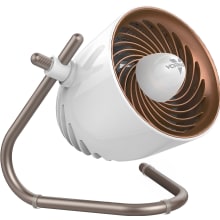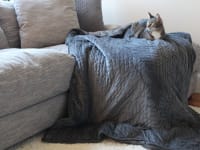Products are chosen independently by our editors. Purchases made through our links may earn us a commission.
As the weather starts getting warmer, it’s important to start looking for ways to beat the heat as you sleep, especially if you’re a naturally hot sleeper. While you can buy a cooling mattress that diffuses body heat, if you’re looking for a more budget-friendly option to stay cool, a fan with strong airflow will be your best bet.
But can sleeping with fans make you sick? To some, it’s just an old wives’ tale, but to others, it’s a legitimate source of concern. For Sleep Week 2024, we’re helping readers figure out the best ways to get restful and restorative sleep, and making sure you keep a comfortable temperature is part of that. Here’s what you need to know about sleeping with fans.
What are the benefits of sleeping with a fan on?
The benefits of sleeping with a fan are well known: The constant blast of air can help you stay cool throughout the night by improving the bedroom’s air circulation, preventing overheating and stuffiness.
The best fans create a constant cool airflow that spreads across a room or wide area. Noise is also a factor, as some sleepers prefer a quiet fan at night, while some who struggle to sleep in silence may enjoy the fan’s white noise as a benefit.
In many households, fans are a seasonal item. During the summer, they’re a necessity, even with air conditioning. In cooler months, a fan may still be a boon, especially for apartment renters or dorm-living college students who can’t control their own heat.
What are the best fans for sleeping?
The type of fan you use may also be a factor. Tower fans are great for whole-room air circulation, pushing air across a wide range of space.
The Dreo Cruiser Pro T1 Tower Fan could be a great addition to your nighttime routine. Its airflow reaches up to 24 feet, remaining quiet across a variety of speed and strength settings. On Amazon, customers love the Dreo Tower Fan, giving it an average 4.7-star rating. They praise its strong and cool circulation, as well as the variety of user-friendly features.

This tower fan is quiet and offers a light-free sleep mode for easy resting.
Another option to consider: desk fans concentrate all their power on a close-range subject—say, your face, when the fan is placed on your night table. These are best used if one sleeper in the room craves a breeze while the other would feel chilled by one.
Our personal favorite is the Vornado Pivot Personal Air Circulator, which offers three settings. At its most powerful, the fan can be noisy, but its lower speeds still provide cool air nearly silently. It also has an attractive sleek look that you won’t mind having on your bedside table.

A desk fan is a highly affordable option for your nightly breeze needs.
Finally, ceiling fans move air around an entire room quickly and effectively, although those require installation over something portable. You can find plenty of great options based on your room size and aesthetic preferences at stores like Home Depot and Lowe’s.
What are the downsides of sleeping with a fan on?
Sleeping with a fan is not all easy and breezy. For one thing, fans can push air throughout the bedroom, which can sap moisture from a sleeper’s eyes, nose, mouth, and throat, especially in the winter months when air is generally drier and the use of heat further exacerbates the issue.
But using a fan at night can be of particular concern for those who suffer from allergies, asthma, or other lung conditions.
“Fans can pick up and circulate dust and other small particles that are present in the room,” said Dr. Xuan Han, a pulmonologist at Tufts Medical Center, in a 2022 interview. “In addition, any dust and other particles that are sitting on the fan blades can be distributed when the fan is turned on.” This increases the amount of irritants in the air and, in turn, what you’re breathing in throughout the night. And if you set up your fan with the window open, you may suck in pollen that could contribute to hay fever.
Can sleeping with a fan make you sick?
If you’re an otherwise healthy individual, you don’t need to worry about your nighttime fan habit translating to more colds or the flu.
“Sleeping with a fan on is unlikely to make you sick,” Han says. “However, it can indirectly cause increased respiratory and allergy symptoms in people who are sensitive to dry air or allergens.” For people with asthma, sleeping with a fan can lead to increased coughing or wheezing.
Not everyone even with those conditions is affected by a fan’s increased circulation of dust and dry air, Han says, but for those who notice negative impacts of sleeping with fans, the result can be poor, restless sleep.
What can you do to improve your bedroom’s air quality?
If you’re not willing to give up the cooling breezes of your fan, you may take a number of steps to mitigate any ill effects from the circulation of dry air and/or dust that it may stir up.
For starters, adding a humidifier placed near the bed or nightstand can add moisture to the air, helping prevent irritation.
Our top pick of the best humidifers we’ve tested is the Levoit Classic 300S, which combines easy-to-use features with a strong, constant output. Its storage tank holds around 2.5 pints of water, which will last up to 16 hours—more than long enough for a good night’s sleep. But the neatest feature may be the Levoit’s smartphone app configuration, which allows you to start, stop, schedule, and even voice-activate the product.

A humidifier is a great bedroom option to prevent a too-dry environment at night.
If your complaint is not dryness but an increase in allergy symptoms or wheezing, you don’t have to toss your fan just yet.
“For people interested in sleeping with fans, I recommend routinely cleaning both the fan and room to minimize circulation of dust and allergens,” Han says. Similarly, moving fans away from your face or bed can help decrease the potential for dust or irritant exposure throughout the night. But pay attention to see if either measure helps. “Watch out for any increase in symptoms that may be associated with fan usage, and talk to your doctor if the symptoms are severe or persistent.”



